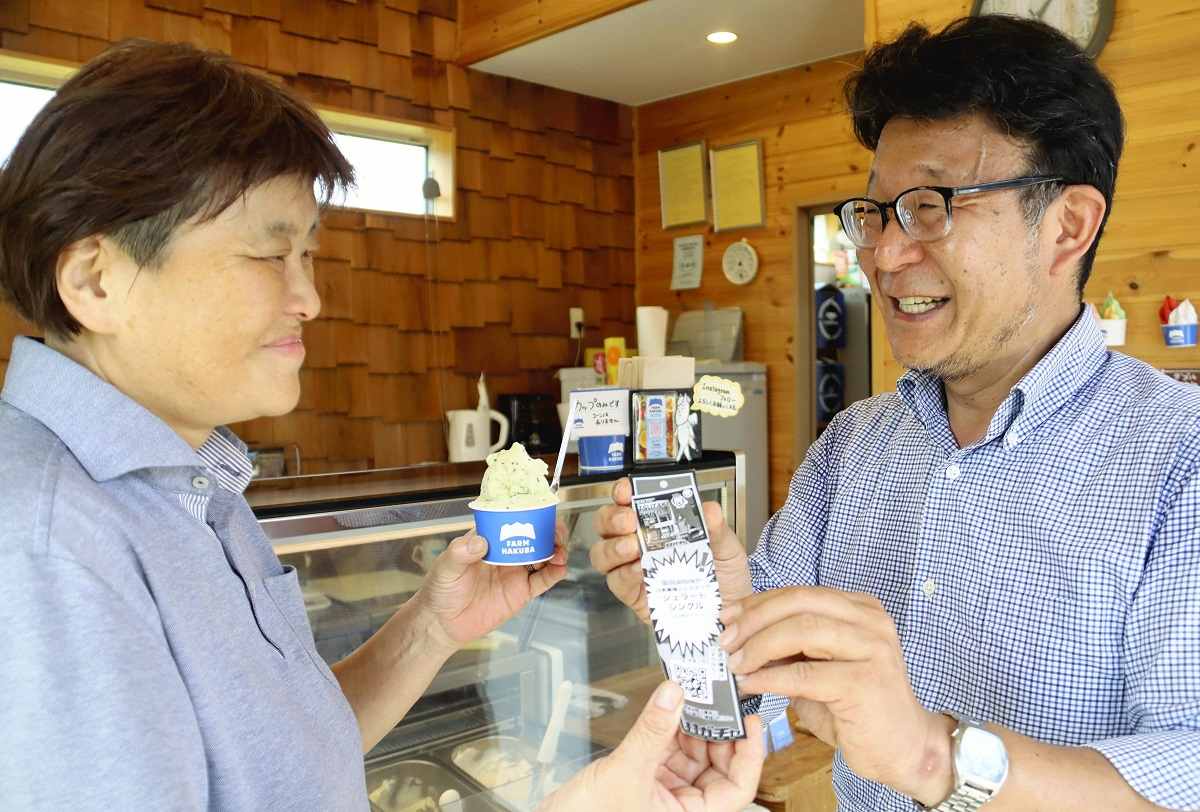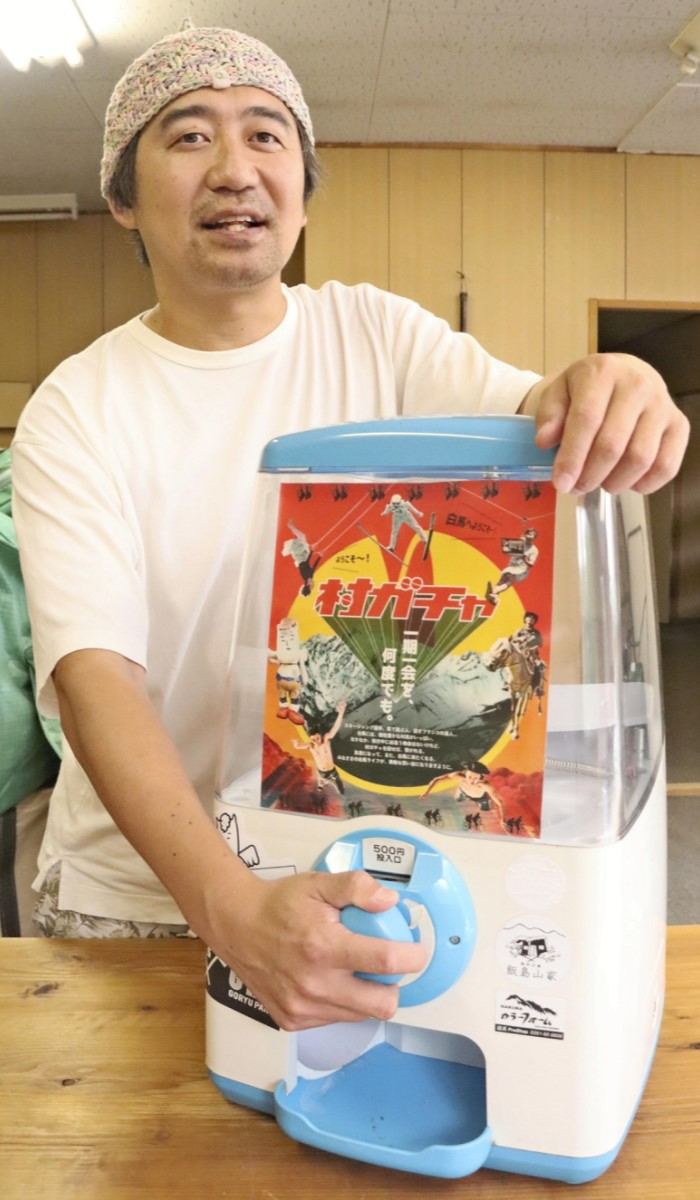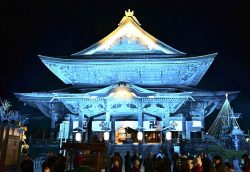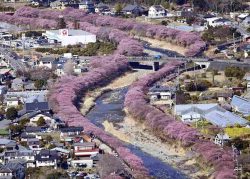Gacha Capsules in Japan’s Hakuba Village Facilitate Tourist-Resident Interactions; Tourists Receive Unique Experiences for ¥500

Takayuki Kemuriyama, right, chats with Akiko Tsutaki, a gelato shop owner, using a coupon contained in a “Mura Gacha” capsule in Hakuba, Nagano Prefecture.
1:00 JST, October 2, 2024
HAKUBA, Nagano — Inserting a ¥500 coin into a gacha capsule vending machine will buy users a unique experience that is popular with tourists in Hakuba, Nagano Prefecture.
After inserting the coin and turning the dial, a capsule containing a photo of a resident and a coupon to meet and share an experience with them will come out.
Gacha capsules usually contain toys. However, the Hakuba version, called “Mura Gacha,” meaning village gacha, allows users to buy a once-in-a-lifetime opportunity to meet locals, rather than purchase objects. These meetings have been used to promote the village and has introduced tourists to lesser-known areas.
Hakuba is in northwestern Nagano Prefecture at the foot of the Northern Japanese Alps and has a population of about 8,400. It is home to an internationally famous resort, which attracts more than 2 million tourists a year. In the summer, visitors tend to go hiking, and in the winter, they tend to go skiing or snowboarding. Hakuba provided three venues, such as for alpine skiing and ski jumping, for the 1998 Nagano Winter Olympics.
Takayuki Kemuriyama, 51, who currently lives in the village for work and away from his family, visited a gelato shop on Sept. 10. He visited the shop owned by local resident Akiko Tsutaki, 63, after receiving a photo of her and a coupon to use at her shop in a Mura Gacha capsule. After entering, he struck up a conversation with her and asked why she opened the shop.
Kemuriyama said he had bought about 50 Mura Gacha capsules and has met about 20 villagers so far.
“I eat things I normally wouldn’t eat,” Kemuriyama said. “It also lets me expand my network of people.”
Tsutaki said, “I’m glad that people are interested in my shop and the village.”
Mura Gacha machines are located in six locations around the village, including at tourist attractions and stores. Along with a photo and coupon, a description of the resident’s personality is included in the capsule. The residents who can be found in the capsules are members of the Mura Gacha system.
The coupons vary depending on the resident and includes such experiences as meeting the Hakuba Station chief and touring a ski jump stadium.

Atsutoshi Sato, who devised the “Mura Gacha” system, poses with a “Mura Gacha” capsule vending machine in Hakuba, Nagano Prefecture.
The idea of the Mura Gacha system was conceived by Atsutoshi Sato, 44, who moved from Chiba Prefecture and operates a snowboard shop in Hakuba. Sato felt that in recent years, tourists only visited specific areas and stayed at certain lodging facilities, leading to limited interactions with most for the village’s residents.
In July 2022, he launched the Mura Gacha system, which uses residents as a tourism resource, in the hopes that “tourists will make their trip special by interacting with local people.”
The system also benefits residents who take part. When a tourist uses a coupon, the resident receives ¥300 per coupon from the sales of the capsules. The members are usually owners of eating and drinking establishments. They can also expect repeat customers.
Mura Gacha has spread via internet and word of mouth. The number of gacha users was 800 in its first year. However, it has grown to 2,000 in two years, and about 50% have actually met with the residents. The number of registered gacha residents has now increased to 76.
The system has even led to people moving to the village.
Takahiro Yokota, 28, who works at a glamping facility in Hakuba, was a teacher at a public high school in Kanagawa Prefecture before moving to the village. He decided to switch jobs after hitting it off with the facility’s president, whom he met through the Mura Gacha system, and moved in April 2023.
“Gacha changed my life for the better,” Yokota said.
Yokota said he plans to soon register in the Mura Gacha system.
The village’s tourism department estimates that the number of tourists to the village in 2021 was 40% less compared to 2019 due to the COVID-19 pandemic. However, in 2023, the number was 2,384,700, nearing pre-pandemic levels.
The village’s government, which is seeking new ways to promote tourism, has included the Mura Gacha system as a reward in the furusato nozei hometown tax donation system from last year through this spring.
“We’re so grateful that the system has served as a way to attract tourists [and has become a way for tourists] to form connection with local residents,” a village official said.
Sato has begun selling packaged Mura Gacha capsules for tourists to buy as souvenirs.
Sato said he wants to offer trips in which people can connect with each other via the Mura Gacha system.
System spreading
Hakuba’s gacha system is spreading nationwide. Those who want to learn about the system have visited Sato, and it has been implemented in Ishigaki, Okinawa Prefecture, and Sakegawa, Yamagata Prefecture, among other areas.
Sato and officials in charge of the system from four municipalities have formed the “Mura Gacha Brothers.” They hope to attract tourists together by adding “rare capsules” that contain transportation tickets and coupons that can be used in other municipalities.
Prof. Tatsuya Uchiyama of Josai International University’s Faculty of Tourism specializing in tourism town planning, said: “The gacha system is an initiative that can be expected to not only attract more tourists, but also encourage more people to have a continuous relationship with local communities. As the system also helps tourists spread out, it can be a measure against overtourism.”
Top Articles in Features
-

Tokyo’s New Record-Breaking Fountain Named ‘Tokyo Aqua Symphony’
-

Sapporo Snow Festival Opens with 210 Snow and Ice Sculptures at 3 Venues in Hokkaido, Features Huge Dogu
-

Tourists Flock to Ice Dome Lodge at Resort in Hokkaido, Japan; Facility Invites Visitors to Sleep on Beds Made of Ice
-

High-Hydration Bread on the Rise, Seeing Increase in Specialty Shops, Recipe Searches
-

Heirs to Kyoto Talent: Craftsman Works to Keep Tradition of ‘Kinran’ Brocade Alive Through Initiatives, New Creations
JN ACCESS RANKING
-

Japan PM Takaichi’s Cabinet Resigns en Masse
-

Japan Institute to Use Domestic Commercial Optical Lattice Clock to Set Japan Standard Time
-

Israeli Ambassador to Japan Speaks about Japan’s Role in the Reconstruction of Gaza
-

Man Infected with Measles Reportedly Dined at Restaurant in Tokyo Station
-

Videos Plagiarized, Reposted with False Subtitles Claiming ‘Ryukyu Belongs to China’; Anti-China False Information Also Posted in Japan























